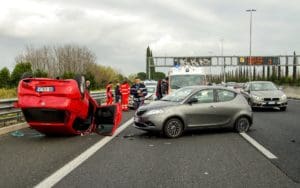If you get involved in a car accident, make sure you’re prepared. Our car insurance accident checklist will help you manage the accident and report it properly to your insurers – without jeopardising your cover.
It’s a sad fact, but even the best and safest drivers have accidents from time to time.
No matter how sensible you are, others aren’t. Some drivers are just accidents waiting to happen – how many times have you been tailgated or undertaken at speed over the last few years?
It’s not just drivers either. Pedestrians can step out in front of you, forcing you to swerve and crash. If you’re really unlucky, large animals like deer can spring into the road causing major damage to your vehicle.
Then when the winter comes you’ve even more to contend with – black ice, snow, rain, hail, wind. They all make necessary car trips that bit more dangerous.
Despite all the dangers, many of us will drive for decades without getting so much as a scratch to our paintwork.
But some of us will be unlucky – so it’s not only important to buy the most comprehensive car insurance you can afford, but to be prepared in case an accident happens.
That way you can not only deal with the accident itself as efficiently as possible, you can also take steps to make sure your insurance claim is as smooth as possible.
To help you, we’ve put together a car insurance accident checklist. Follow it and you’ll be more likely get the best outcome from any car accident you’re involved in.
Safety first
The first thing you should do if you’re involved in a car accident is to stop. Even if it is not your fault, you are legally required to stay if you are in an accident involving any other vehicle, person, animal or someone’s property.
If you don’t you could face a fine of up to £5,000, get five penalty points on your licence and even be banned from driving.
Next, check everyone involved is safe and uninjured – and to make sure the accident scene doesn’t become a danger to other road users.
If anyone has been injured, call 999 immediately and request the emergency services.
Make sure all engines are switched off and then turn on hazard lights to make the scene as visible as possible. If you or another driver has a warning triangle, place it at least 45 metres behind the accident scene.
Carry the right equipment
When you have a car accident, it’s important to gather as much information about it as possible.
That’s why it’s a good idea to carry these items with you at all times:
- A single use or digital camera (or cameraphone)
- A torch
- A notepad
- A pen or pencil
- Measuring tape.
If you don’t want to put together your own car insurance accident kit, you can buy ready-prepared kits online – some also come with diagrams of road layouts for easy accident reporting plus step-by-step guides to managing the accident.
Car insurance reporting
After you’ve made sure everyone involved in the accident is safe, you need to exchange insurance details with the driver or drivers of the other vehicles.
To make this process simpler, always carry your insurance certificate with you. You’ll also need to gather these details at the scene.
- Details of any other driver’s car insurance policy – the name of the insurance company, the policy expiry date, whether the policy is third party or fully comprehensive.
- Details of each car’s owner, if they are a different person to the driver.
- Contact details of all involved.
- The make, model, colour and registration number of all vehicles involved, plus the damage sustained.
- Photographs of the accident scene and damage to vehicles – if you don’t have a camera, at least make sketches. Note the positions of the vehicles and make measurements if possible.
- Details of the weather and the road conditions – e.g. whether it was wet.
- What the vehicles were doing as the accident happened.
- Any other relevant details, such as whether other parties were using headlights or indicators.
Do not discuss blame with other drivers, and do not accept liability – it may cause problems later on when insurers get involved.
Call your car insurance company
You should also call your car insurance company as soon as possible – ideally from the accident scene. If you don’t, you may well be breaching the terms of your policy.
If no-one has been injured, you should also inform the police about the accident. If the other driver or drivers don’t have their insurance certificates, you may need police help if they are not supplied later on or they even turn out to be uninsured.
Personal injury claims
You may have read how many insurers sell on details of accident victims to personal injury claims specialists. Only ever make a claim for injuries you have actually sustained, and if you’d prefer your car insurance company not to sell on your details, read the fine print and opt out when you take out the policy.
No-one wants to be involved in an accident, but if you follow the steps in this article it should make your insurance claim a lot smoother – so drive safely, and be prepared!
